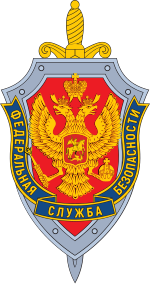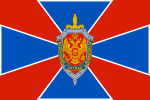
Back FSB Afrikaans جهاز الأمن الفيدرالي (روسيا) Arabic Rusiya Federal Təhlükəsizlik Xidməti Azerbaijani Рәсәй Федераль именлек хеҙмәте Bashkir Федэральная служба бяспекі Расіі Byelorussian Фэдэральная служба бясьпекі Расейскай Фэдэрацыі BE-X-OLD Федерална служба за сигурност Bulgarian ফেডারেল সিকিউরিটি সার্ভিস Bengali/Bangla FSB Breton Servei Federal de Seguretat Catalan
| Федеральная служба безопасности Российской Федерации | |
 Emblem of the Federal Security Service of the Russian Federation | |
 Flag of the Federal Security Service of the Russian Federation | |
| Agency overview | |
|---|---|
| Formed | 3 April 1995 |
| Preceding agency | |
| Type | Independent |
| Jurisdiction | Russia |
| Headquarters | Lubyanka Building[1] |
| Employees | Classified |
| Annual budget | Classified |
| Agency executives |
|
| Website | fsb Building details |
Федеральная служба безопасности Российской Федерации | |
 Lubyanka Building | |
The Federal Security Service of the Russian Federation[a] (FSB) is the principal security agency of Russia and the main successor agency to the Soviet Union's KGB; its immediate predecessor was the Federal Counterintelligence Service (FSK) which was reorganized into the FSB in 1995. The three major structural successor components of the former KGB that remain administratively independent of the FSB are the Foreign Intelligence Service (SVR), the Federal Protective Service (FSO), and the Main Directorate of Special Programs of the President of the Russian Federation (GUSP).
The primary responsibilities are within the country and include counter-intelligence, internal and border security, counterterrorism, surveillance and investigating some other types of serious crimes and federal law violations. It is headquartered in Lubyanka Square, Moscow's center, in the main building of the former KGB. The director of the FSB is appointed by and directly answerable to the president of Russia.[2] Being part of Russia's executive branch formally, the FSB has significant, if not decisive, power over it.[3]
In 2003, the FSB's responsibilities were expanded by incorporating the Border Guard Service and a major part of the Federal Agency of Government Communication and Information (FAPSI); this would include intelligence activities in countries that were once members of the Soviet Union, work formerly done by the KGB's Fifth Service. The SVR had in 1992 signed an agreement not to spy on those countries; the FSB had made no such commitment.
- ^ "Информация ФСБ России :: Федеральная Служба Безопасности". fsb.ru. Retrieved 5 June 2024.
- ^ "Статья 1. Федеральная служба безопасности и ее назначение". Archived from the original on 16 August 2018. Retrieved 16 August 2018.
- ^ Chernysh, Vadym (5 March 2024). "The Ability of Russia's Federal Security Service to Influence the Executive Through its Apparatus of Seconded Employees". Journal of Strategic Security. 17 (1): 31–41. doi:10.5038/1944-0472.17.1.2164. ISSN 1944-0464.
Cite error: There are <ref group=lower-alpha> tags or {{efn}} templates on this page, but the references will not show without a {{reflist|group=lower-alpha}} template or {{notelist}} template (see the help page).